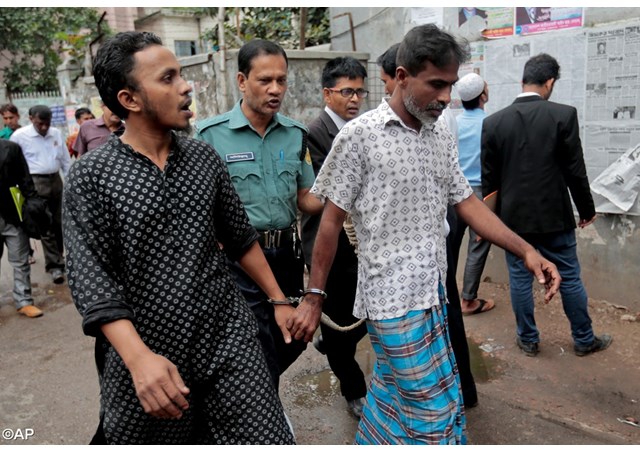
Bishop, activists critical of anti-militancy drive in Bangladesh

Christian leaders including a Catholic bishop have criticized and cast doubt over the effectiveness of an ongoing anti-militancy drive that have seen thousands of arrests in Bangladesh over the past three days.
Police in Bangladesh said Monday they detained more than 8,500 people in the first four days of a countrywide security operation aimed at combating extremist violence against religious minorities and secular activists. Thousands of policemen and members of paramilitary units are taking part in the crackdown, which is targeting suspected militants and people with criminal records, according to police. Of the people arrested, 120 are suspected militants, police said. The political opposition said Sunday that the law-enforcement agencies were rounding up opposition activists on the pretext of fighting terrorism, something authorities denied.
Bishop Gervas Rozario of Rajshahi, chairman of the Bangladesh Catholic bishops’ Justice and Peace Commission said the government may have an ulterior motive for the crackdown. "The government might have a different agenda including weakening opposition parties further because this crackdown is not an effective way to eradicate militancy," Bishop Rozario told ucanews.com.
The government, under pressure to curb a wave of extremist violence that has resulted in the deaths of more than 40 people over the past 12 months, insists the arrests are necessary to restore law and order. The violence has been directed against members of religious minorities, secular bloggers, university teachers and foreign aid workers. In Bangladesh, mass arrests have often been the government’s response to a deterioration in law and order. The arrests over the weekend were made under broad public-order legislation.
Instead of mass arrests, the government needs to use intelligence agencies more effectively to flush out militancy, and make effective efforts to prevent and investigate attacks on minority communities, he said. "Police can make quick arrests in sensational cases, but fail to do so in cases of militancy or attacks on minorities, which is surprising," Bishop Rozario said. The government should check why detectives are failing and ensure that they do their duty more effectively," he added.
Human-rights groups have warned that such arrests and the weakening of the opposition risk bringing greater instability to the Muslim-majority South Asian country. Bangladesh’s parliament has been without an effective opposition since 2014, when opposition parties boycotted national elections, accusing the government of trying to rig the vote.
Several suspected Islamist militants in police custody died in shootouts last week, officers said. Human-rights activists said extrajudicial killings are often described as shootouts, and that the country could be caught in a worsening cycle of tit-for-tat violence.
A report released in April by the International Crisis Group said the government’s reaction to the extremist threat, including the arrest and prosecution of suspects “without due process and transparency, is fueling alienation that [terrorist] groups can further exploit.” The government has dismissed such concerns.
Most of the attacks against minorities and activists in the country have been claimed by Islamic State or al Qaeda. Islamic State said over the weekend that it was behind the killing of a Hindu priest in northeast Bangladesh, according to the SITE intelligence group, which tracks jihadist activity.
The Bangladesh arm of al Qaeda in the Indian Subcontinent, or AQIS, issued a statement on Friday condemning the killing of the wife of a senior police official in the southern port city of Chittagong. No group has claimed responsibility for that attack.
The statement said Islam didn’t allow revenge against the families of combatants, adding: “The sword which we have unsheathed…will not strike women and children.” The uptick in attacks on liberal and secular voices in Bangladesh has heightened concerns about the rise of radicalism in the country of more than 160 million.
Bangladesh, an officially secular republic, has experienced large protests and counter protests in recent years over the role of religion in society. The debate has coincided with a violent political schism between the country’s two main political parties.
Dhaka denies that militant groups such as Islamic State and al Qaeda are operating in Bangladesh, instead blaming the opposition for orchestrating the violence. The opposition has denied involvement and says the regime’s policies are creating favorable conditions for the rise of extremists.
(Source: UCANews, WSJ)
| All the contents on this site are copyrighted ©. |


